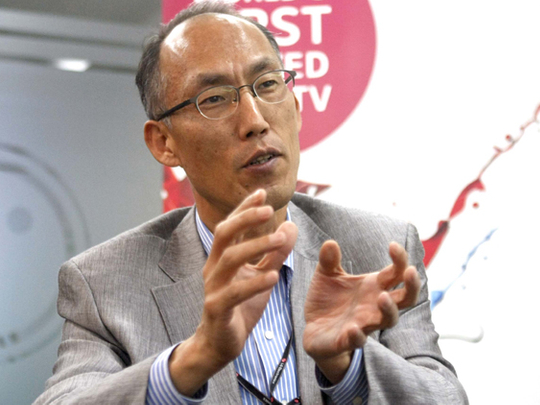
Dubai
LG Electronics, the world’s second-largest TV manufacturer, expects global currency fluctuations to pose a major challenge for growth this year, a top official told Gulf News.
“The growing volatility in emerging market currencies and the strong Japanese yen mean higher costs despite rise in revenues,” D.Y. Kim, president of LG Gulf, said.
LG manufacturers most of its products in South Korea and exports it overseas. Revenues grew 10 per cent last year, mainly fuelled by TV and mobile phone business. “Mobile phones grew almost 50 per cent last year and it will be our growth engine this year also,” Kim said.
Its TV business, which was hit by the 36 per cent duty by India Customs, grew only 10 per cent. He said the customs duty will impact LG’s 32-inch to 47-inch TV sales this year also but the overall growth is expected to come from the premium televisions like ultra high-definition (UHD or 4K) and organic light-emitting diode (OLED) sets.
“Due to the awesome viewing experience on 4K TVs, many consumers are likely to own one of these sets despite the cost factor,” Sweta Dash, senior director for display research at IHS, said.
She said that 4K TVs are gaining acceptance across the world as Taiwanese suppliers are reducing the panel prices and Chinese brands are offering low-priced 4K TVs.
“We are seeing a big shift towards 4K TV acceptance this year. Some of the brands have reduced the prices of 4K TVs in the second half of last year,” she said.
Sony, Samsung, LG, TCL, Toshiba, Philips, Nakamichi, Skyworth and Hisense have launched 4K TVs in the UAE with prices ranging from Dh6,999 to Dh100,000.
Kim said sales of UHD and OLED TVs will be limited as the products are expensive, but there are customers who want innovative and premium products.
LG, which earns a major portion of its revenues from the mobile phone sales, sees a bright outlook for the segment.
Kim expects LG’s mobile business to grow by 50 per cent from the region this year as more models are expected to be launched compared to 20 models last year.
“Our global strategy is to become the number one smartphone manufacturer in the next four years,” Kim said.
The smartphone market “will be tough this year” and “we are here to compete as we produce our core components in-house. We are late into the mobile phone business but we have the technology and the brand recognition,” he added.
In 2013, LG, ranked fourth globally in mobile phone segment, registered a year-on-year growth of more than 81 per cent with a market share of 4.8 per cent.
Samsung was the leader with 31.3 per cent market share, followed by Apple with 15.3 per cent and Huawei with 4.9 per cent.










